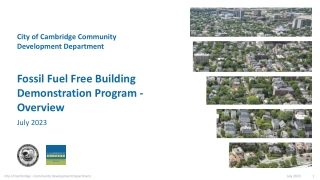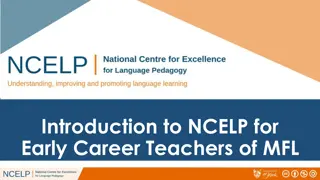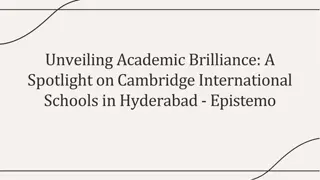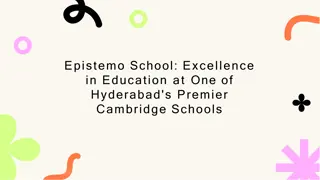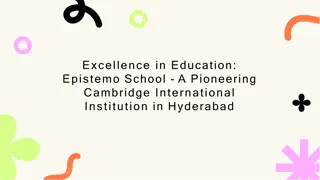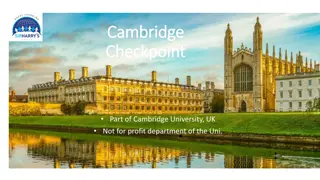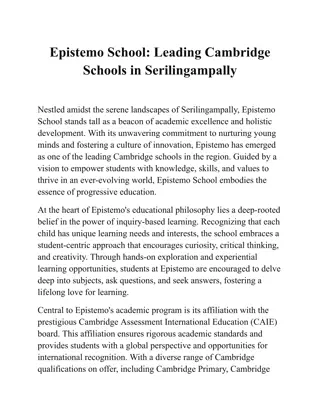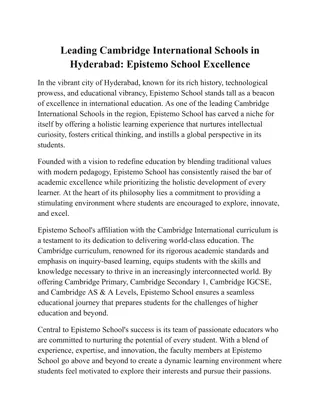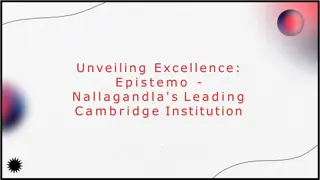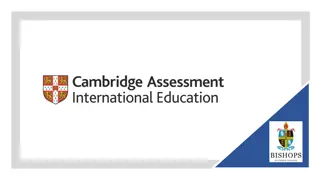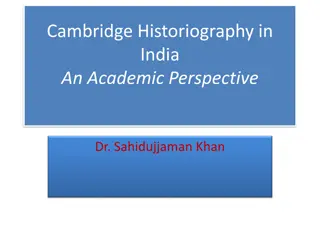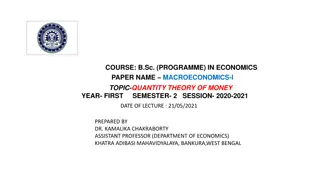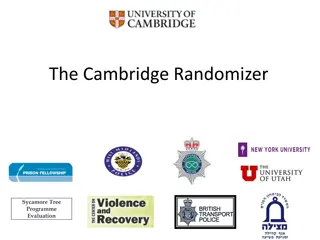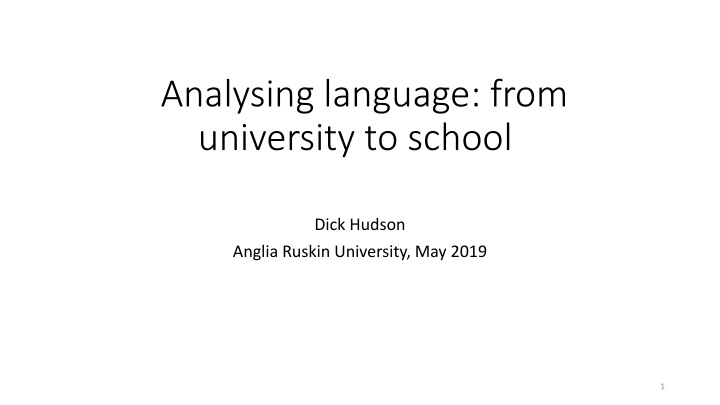
Language Analysis: Challenges and Solutions in MFL Education
Explore the decline of modern foreign language (MFL) teaching, driven by factors like lack of support and outdated approaches. Discover the importance of combining communicative methods with grammar instruction for effective language learning.
Download Presentation

Please find below an Image/Link to download the presentation.
The content on the website is provided AS IS for your information and personal use only. It may not be sold, licensed, or shared on other websites without obtaining consent from the author. If you encounter any issues during the download, it is possible that the publisher has removed the file from their server.
You are allowed to download the files provided on this website for personal or commercial use, subject to the condition that they are used lawfully. All files are the property of their respective owners.
The content on the website is provided AS IS for your information and personal use only. It may not be sold, licensed, or shared on other websites without obtaining consent from the author.
E N D
Presentation Transcript
Analysing language: from university to school Dick Hudson Anglia Ruskin University, May 2019 1
Plan 1. The MFL crisis 2. Communicative approaches 3. Selling MFL to teenagers 4. Language analysis in MFL teaching 5. Language analysis at university 6. Two university-based initiatives: UKLO and LASER 2
1. The MFL crisis MFL teaching is dying Main evidence: fall in A-level MFL. Incidentally, English also entered a crisis at A-level about 2010 .... What Michelle and colleagues say about MFL also applies to English Language GCSE: the syllabus allows language analysis, but the exams don t. Why? Lack of commitment from government, employers, parents, league tables, head teachers Or poor teaching? curriculum, assessment, pedagogy 3
When did the MFL crisis start? 2004: GCSE optional 1988: GCSE created 1975: grammar died dead in English communicative pedagogy the downward spiral in language provision... which set in in the mid- 1960s Hawkins 1987 French + German + Spanish FGS 50000 45000 GCSE optional 40000 35000 30000 25000 20000 Communicative teaching started 15000 1988 O-level + CSE > GCSE 10000 5000 0 FGS 1965 1975 1985 1995 2005 2015 4
2. Communicative approaches ... By Manuel Aicart: Communicative approaches (in their strong version) have a great appeal because of the implication that learning by talking means not learning grammar. However, since language is composed of grammar, trying to learn a L2 without grammar is like trying to learn math without numbers. 5
.... continued Whenever you learn a language you are learning grammar either deductively or inductively. But learning grammar inductively (e.g through the context) does not mean not learning at all. In fact, the more inductive the learning, the more you have to turn to your analytical skills. In other words, the less you understand, the more you have to figure out what it means. This is why communication alone is not the key to learning a L2. As Swan (1985) points out, grammar has not become any easier since the communicative revolution. There is a difference between learning and practising with the language. Throwing balls over a net does not mean that you re learning how to play tennis. This is why it is important to combine communication with form-focused instruction and activities to provide scaffolded learning. 6
3. How not to sell MFL to teenagers: Use only the target language in class. What if they can t understand? Insist on pupil-pupil interaction in TL. How embarrassing for a teenager! Promise conversational skills which turn out to be useless on the first encounter. Ignore their knowledge about English. e.g. French has rules, but English doesn t. 7
Whats good about current MFL teaching It provides plenty of authentic material. It aims at (some) spoken skills as well as reading/writing. It embeds the language in the culture and in communication situations. It uses textbooks. Unlike many other subjects. Textbooks are attractive. 8
A better approach Keep the good bits. Offer measurable progress. e.g. number of words known i.e. vocabulary tests Offer explanations and understanding. i.e. phonics, grammar, semantics, sociolinguistics/pragmatics Organise teaching by language structure, not by tasks. e.g. by tenses, by vocabulary Build on their knowledge about English. i.e. compare and contrast 9
The Bauckham report (2016) Pupils need to gain systematic knowledge of the vocabulary, grammar, and sound and spelling systems (phonics) of their new language, and how these are used by speakers of the language. They need to reinforce this knowledge with extensive planned practice and use in order to build the skills needed for communication. Languages teachers should know and build on the grammar taught in the key stage 2 national curriculum for English. Assessment should use a range of tasks, including those focused on specific aspects of the language taught, such as vocabulary or grammar. 10
More common sense from Manuel Aicart There is not one methodology that is perfect, but all of them have something to offer. The grammar-translation method can be good for some structured grammar explanations. The direct method tells us to use the target language ... and focuses on the development of oral skills inductively. Audio-lingual methods are useful wherever repetition may be necessary. And the communicative approach can help us to integrate the four skills to make all practice meaningful. 11
3. Language analysis in MFL teaching Language analysis = linguistics. process: ANALYSE (v), ANALYSIS1 (n) product: ANALYSIS2 (n) = the result of ANALYSIS1 Both process and product have a place in MFL teaching. process, e.g. asking: What s the tense of this verb? What does this word mean? How is French gender different from English? product, e.g. telling: In French, <an> is pronounced / / except before a vowel. 12
Why MFL needs language analysis As a tool for teaching and learning: to help those who can t induce rules or solve problems to save time to consolidate learning As mind training 13
Language analysis as mind training A language is an example of a complex network of information e.g. all the information relevant to forming the French verb portait It s also an example of an unforgiving set of constraints some answers are wrong! and of a system with fixed variables and constants e.g. tense(X) = past form(future(X)) = ai (etc) + form(infinitive(X)) With language analysis, MFL is like STEM in its potential for rigour . But where would future teachers learn language analysis? 14
4. Language analysis at university NOT in typical MFL departments Among Russell Group French departments in 2011 and 2016 only 14/21 BA programmes include language modules. only 13/18 include research staff with a research interest in language overall: 11% of research staff work on language. only 2 programmes include Applied Linguistics modules. unlike the vocational language courses in European universities. I.e. a typical MFL department gives language very low status doesn t offer any encouragement to potential MFL teachers. 15
Why do MFL departments ignore language? I don t know. But English departments are similar. And the uncertainty over language dates from the 19th century, when these departments started. But it s deeply shortsighted now, because MFL departments need to produce the next generation of brilliant school teachers who need to know about the target language. And without BA applicants, they re doomed. 16
But meanwhile, linguistics departments ... ... have flourished since the mid-20th century. They could produce the language analysis needed by MFL departments. But: Very few research linguists work on MFL languages. A typical linguistics department doesn t promote teaching. Linguistics graduates typically lack MFL skills. REF doesn t recognise dissemination or outreach as research. So there s a structural problem. And meanwhile, there s a critical shortage of MFL teachers. 17
5. Two university-based initiatives Both were created by CLiE = the Committee for Linguistics in Education, a joint committee of LAGB (Linguistics Association of Great Britain) BAAL (British Association for Applied Linguistics) UKLO = the UK Linguistics Olympiad. LASER = Language Analysis in Schools: Education and Research. 18
UKLO A competition for school children. Round 1 is run by teachers in schools. Most of the teachers are from MFL. Four levels of difficulty: Advanced (KS5) Intermediate (KS4) Foundation (KS3) Breakthrough (KS2) Youngest entries so far are from Year 4! Started 2010 2018: nearly 5,000 competitors 19
Japanese hiragana Competitors spot regularities. Inductive reasoning. Problem solving. Like maths. 20
Danish numbers It is maths! But it s also MFL. And it s interesting to see how different Danish is. 21
UKLO in MFL Competitive so many kids love it! But it s a test of intelligence and problem-solving skills. So not for all. But many schools now have Linguistics Clubs typically run by MFL teachers. And some schools have even started teaching linguistics as preparation for MFL. 22
LASER Not (necessarily) competitive. Linguistics in the ordinary school curriculum. Recently launched. Chaired by Michelle Sheehan and Graeme Trousdale. So watch this space. But here are some examples of possible LASER activities in MFL classrooms. 23
French has irregular verbs. Does English? present past regular? kicks kicked yes takes made sprinted teaches was gets goes 24
Agreement C'est ma vie Je m'appelle Ang lica Summer, j'ai 12 ans et je suis canadienne. Il y a 5 ans, ma famille et moi avons d m nag dans le sud de la France. Mon p re, Frank Summer, est m canicien ; il adore les voitures anciennes et collectionne les voitures miniatures. Ma m re s'appelle Emilie Summer ; elle est infirmi re dans un h pital non loin de notre maison. Nous avons d m nag en France, parce qu'elle a toujours aim la culture de ce pays. English: how do we choose between this and these? Give examples. French: mon and ma both mean my . How do French speakers choose between them? Find evidence in the passage. Relevant vocabulary: vie = life famille = family p re = father m re = mother 25
Power and distance/solidarity vous ? Professor Smith Prof? Problem: you = tu or vous, so how to choose? Depends on how I see you in terms of power: how much power do you have, compared with me? distance: how close are we? For example, suppose you are my ... English: you = William Smith French: tu to close equal/subordinate otherwise vous or uncertainty examiner tutor Bill distance friend me tu power unknown student son Billy William Smith tu ? 26
So why language analysis (LA)? LA provides a framework for thinking and talking about language which extends into social interaction. LA throws light on both L1 and L2 and shows that both CAN be analysed. LA deepens learning of L2. LA integrates learning of L2 with L1, and reinforces both. LA motivates students because it s structured it s interesting it s about their own thinking. 27
Thank you for listening This talk can be downloaded from www.dickhudson.com/talks 28

